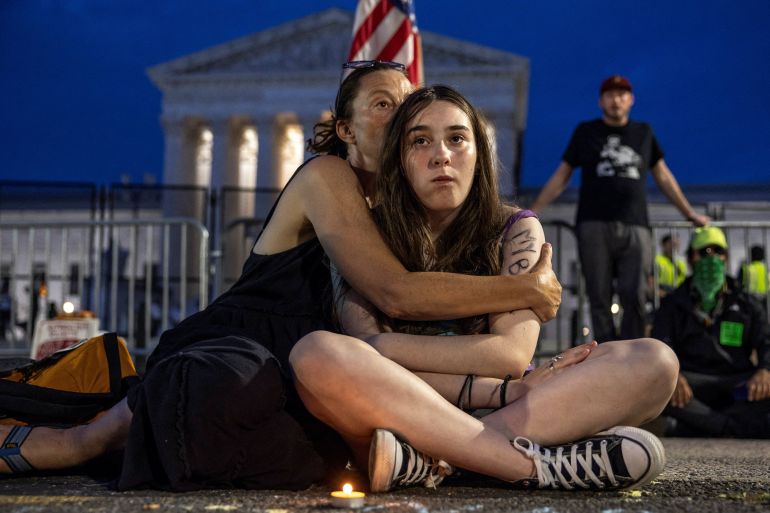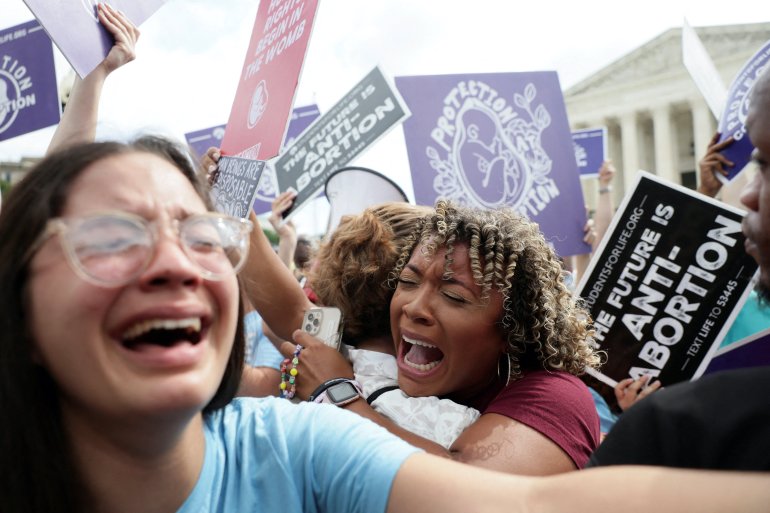The end of Roe v Wade will hurt poor women most, economists warn
Anti-abortion groups say that the US economic system is broken if women feel like they have to choose ‘between sacrificing their education and career and sacrificing their children’.

The United States Supreme Court’s overturning of Roe v Wade, the nearly 50-year-old landmark decision that recognised women’s right to abortion, will come at a high economic cost, some economists warn while other experts and anti-abortion advocates argue that higher fertility rates will have a positive effect on the economy.
In a 6-3 vote, the conservative-dominated top court last Friday ruled that the US Constitution “does not confer a right to abortion”, deciding that “the authority to regulate abortion is returned to the people and their elected representatives”.
Keep reading
list of 4 itemsRoe v Wade: Supreme Court decision highlights US abortion divide
‘Sad day’: US Supreme Court overturns Roe v Wade
Key takeaways from Supreme Court ruling overturning Roe v Wade
The ruling will cause economic pain in 26 states where abortion bans are most likely to go into effect and where people already face lower wages and limited access to healthcare, the Economic Policy Institute warned following the decision.
Economists Al Jazeera spoke to echoed that concern, arguing that state-level limitations on abortion access will cause economic hardship and restrict women’s financial potential.
While some women will be able to travel to obtain abortions out of state, for others the cost will be “financially catastrophic”, Jason Lindo, professor of economics at Texas A&M University, told Al Jazeera.
Young women and women of colour will be disproportionally affected by negative impacts on educational attainment and early career investments, which will exacerbate racial and ethnic inequalities, Lindo added.
“These women will suffer economically,” he said.
According to the Institute for Women’s Policy Research (IWPR), a non-profit research organisation based in Washington DC, state-level abortion restrictions cost the US $105bn annually.
IWPR found that abortion restrictions at the state level reduce labour force participation and earnings levels and increase turnover and time off from work among women ages 15 to 44 years.
On a national scale, if all state-level abortion restrictions were eliminated, IWPR’s analysis estimates that an additional 505,000 women aged 15 to 44 would enter the labour force and earn about $3bn a year. US national gross domestic product (GDP) would climb nearly 0.5 percent, according to the research organisation.
US Treasury Secretary Janet Yellen in May warned of the economic consequences of overturning Roe v Wade, telling the Senate Banking Committee that restrictive reproductive rights would set women back decades.
“I believe that eliminating the right of women to make decisions about when and whether to have children would have very damaging effects on the economy,” Yellen told lawmakers.
But critics say that economists like Yellen are looking at the short run, not the long run.
“Children are literally the future economy and all the macro-economic models, and even government programmes like Social Security, show that higher fertility rates have a positive effect on the economy,” Rachel Greszler, a senior research fellow at The Heritage Foundation, a Washington, DC think-tank, told Al Jazeera.
Three out of four women who get abortions are already living below 200 percent of the poverty level, she added. That means earnings of less than $27,000 a year.
“A lack of access to abortion is not going to be the difference between going to college and attaining financial stability or not,” Greszler said.
Unintended childbirths that result from reduced abortion access slam women’s future earnings, college graduation rates, and professional attainment, argues David Slusky, an associate professor of economics at the University of Kansas.
“We know from studies that missing a wanted abortion deteriorates a household’s financial situation for at least several years to come,” he said.
Hurt or help the economy: Differing views
Anti-abortion groups and advocates with whom Al Jazeera spoke say that abortion has harmed the economy.
“A majority of the 63 million babies aborted since Roe v Wade would now be working, paying taxes, and paying into Social Security and Medicare,” Carol Tobias, president of the National Right to Life Committee (NRLC), told Al Jazeera.
“Consider the immeasurable talent we’ve lost to abortion — employers and employees, inventors, entrepreneurs, artists, musicians, teachers, doctors, scientists,” she said.

Three-quarters of abortion patients are low income and nearly half live at less than the federal poverty level, according to the reproductive rights group the Guttmacher Institute.
President Serrin M Foster of Feminists for Life of America, a group advocating against abortion, says the system is broken if “women feel like they have to choose between sacrificing their education and career and sacrificing their children”.
“A lack of accommodations in school and workplace, and the lack of paternal support, is what drives women into poverty,” Foster told Al Jazeera.
There are 2,700 “pregnancy resource centers” across the US offering pregnant women support and services, according to the NRLC. States that already have or are preparing to adopt abortion restrictions are also responding with programmes to provide additional care, the anti-abortion organisation said.
But Lindo, the economics professor at Texas A&M University, said that despite support programmes the economic impact of Americans having children they otherwise would not have had is likely to get much worse and grow over time.
“There will be more people on this altered path of lower levels of education and lower labour force participation. Given that household resources are important determinants of a child’s success, the effects will extend into the next generation,” he said.
NRLC’s Tobias pushed back on that premise: “Abortion has been legal in the US for 50 years. If encouraging poor women to get an abortion helps them financially and lifts them out of poverty, why do we still have poor women?”